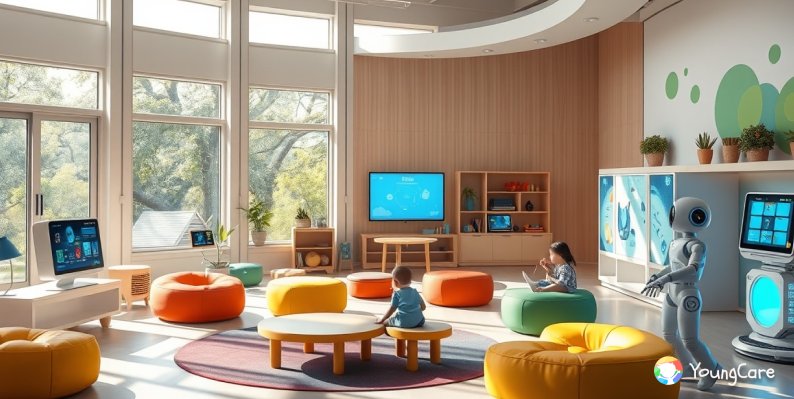This article delves into how Artificial Intelligence is reshaping Applicant Tracking Systems (ATS) — moving from simple resume databases to intelligent platforms that automate candidate screening, personalize experiences, and enable data-backed hiring decisions. It discusses the evolution, major benefits like efficiency and consistency, and real-world applications across startups and enterprises. The article also covers critical challenges such as bias, privacy, and over-reliance on automation while emphasizing future trends like ethical AI, transparency, and integrated HR ecosystems.
The Origin Story From Paperwork to Predictive Analytics

Historically, childcare centers managed daily operations through manual record-keeping, phone calls, and paper forms to track attendance, billing, and parent communication. This traditional system was time-consuming and often left staff overwhelmed while parents lacked real-time visibility into their child’s activities and wellbeing. The shift toward digital transformation began with simple childcare management software, but the true revolution started with the introduction of Artificial Intelligence (AI) and Machine Learning (ML). These advanced technologies brought greater efficiency, transparency, and personalization to childcare management.
By automating repetitive tasks, analyzing complex data, and providing actionable insights, AI-powered childcare apps now allow educators and administrators to focus more on nurturing and engaging with children rather than being burdened by administrative work.
Core Ideas What Makes AI-Powered Childcare Apps Unique?

- Automated Administration and Predictive Analytics- Artificial Intelligence (AI) automates repetitive administrative tasks like attendance tracking, billing, and inventory management. This reduces human error, saves time, and allows childcare centers to operate more efficiently. Using predictive analytics, centers can anticipate staffing needs, enrollment patterns, and financial trends for better resource planning.
- Personalized Parent Engagement- AI-powered chatbots and messaging systems enhance communication by providing instant responses to parent queries and sending real-time updates about meals, naps, and activities. Daily reports are automatically generated, showcasing each child’s milestones and progress—strengthening parent engagement and trust.
- Enhanced Child Development Tracking- With computer vision and natural language processing (NLP), AI tools analyze photos, videos, and teacher notes to track a child’s developmental growth. These insights help educators identify early learning challenges and recommend personalized learning activities tailored to each child’s unique needs.
- Secure Data Management- Cloud-based AI childcare systems store sensitive data like health information, attendance records, and payments safely. Robust encryption and access controls ensure that only authorized users can access this data, improving transparency and compliance.
- Multilingual and Accessible Communication- Through NLP, AI childcare apps offer automatic translation and voice-enabled commands, making communication smoother for families speaking different languages. This inclusivity supports global accessibility and enables hands-free operation for busy staff members.
Real-World Applications and Anecdotes

AI-powered childcare platforms like Illumine and Procare are transforming how childcare centers operate by streamlining administrative tasks, boosting enrollments, and maximizing profits. Similarly, UrbanSitter and Care.com use artificial intelligence (AI) to match families with trusted babysitters and nannies based on preferences, reviews, and AI-assisted background checks, enhancing safety and reliability. Smart baby monitors such as Miku and Nanit leverage AI to track and analyze baby sleep patterns, providing parents with real-time insights and analytics. One childcare director shared how automated billing and predictive staffing helped her center reduce operational overhead, allowing more time for mentoring staff and engaging with children. Parents also appreciate receiving instant updates, personalized alerts, and daily activity summaries—fostering a stronger connection with their child even when they are away.
Challenges and Critical Viewpoints

While AI-powered childcare apps offer numerous advantages, they also come with significant challenges that must be addressed. One major concern is privacy and data security, as storing sensitive information digitally requires strong encryption, secure access controls, and full compliance with data protection regulations. Another challenge lies in maintaining the human touch in childcare—critics warn that over-reliance on automation can make care feel impersonal, highlighting the need for technology to enhance, not replace, human interaction.
Additionally, AI bias and reliability remain pressing issues since algorithms can inherit biases from historical data. Continuous monitoring, transparent development, and ethical oversight are essential to ensure that AI systems remain fair, accurate, and trustworthy in childcare environments.
Emerging Trends and Future Possibilities

The future of AI-powered childcare apps is bright, driven by continuous innovation and smarter technologies. Upcoming advancements such as generative AI assistants will handle complex parent queries with ease, offering personalized guidance and support. Personalized learning paths will help children develop at their own pace, while computer vision technology will provide real-time developmental feedback, enabling early intervention when needed. Moreover, the integration of smart devices and wearables will enhance safety, monitoring, and communication between parents and caregivers. As these technologies evolve, AI-powered childcare apps will continue to transform how families and childcare providers interact, making early childhood care more intelligent, secure, and personalized.
Conclusion
AI-powered Applicant Tracking Systems are redefining how organizations attract, evaluate, and hire talent. While automation enhances speed and objectivity, human empathy remains vital to ensure fairness and authenticity in hiring. By blending technology with thoughtful recruitment practices, companies can create efficient, inclusive, and candidate-friendly hiring ecosystems.
Ready to modernize your hiring process? Explore our AI-powered recruitment solutions and see how your organization can attract the right talent faster and more efficiently.

